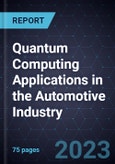New Product Development Initiatives to Focus on Process Optimization and Advanced Materials Research
This analytics highlights quantum computing innovation in the automotive industry and the significance of integrating this technology in supply chain, materials research, vehicle design, vehicle testing, assembly, manufacturing, retail, after-sales, and vehicle-in-motion. Simulations integrated with quantum computing processors analyze multiple pre-production scenarios substantially faster; they are more accurate and have a shorter turnaround time, helping automakers stay ahead of the competition. Quantum computing also helps simulate complex molecular properties and battery material reactions and behaviors at the quantum level and can enable OEMs to design low-cost batteries with new, sustainable materials.
The technology can help optimize traffic management and vehicle routing. BMW, VW, Toyota, Hyundai, Daimler, and Ford are piloting (in partnership) quantum computing for select use cases. Though the proof-of-concept (Poc) for a smaller set of variables looked promising, the future plan will involve scaling up the infrastructure, qubits quality, and using complex sets of parameters. Identifying the right use case is critical before investing in quantum research. OEMs should partner with professional services experts that can help with problem identification through proof-of-concept development and eventually integration into day-to-day production processes. However, huge investment costs and existing pertinent technologies (to digitize the automotive value chain) are currently hindering quantum adoption among OEMs. Right use case identification, coupled with a hybrid quantum-classical computing model, will enable OEMs to achieve the best of both worlds. This analytics presents the overall scope of quantum computing and the current challenges hindering quantum momentum in the automotive industry. It analyzes OEM partnerships and key use cases.
Table of Contents
Companies Mentioned (Partial List)
A selection of companies mentioned in this report includes, but is not limited to:
- BMW
- Daimler
- Ford
- Hyundai
- Toyota
- VW








